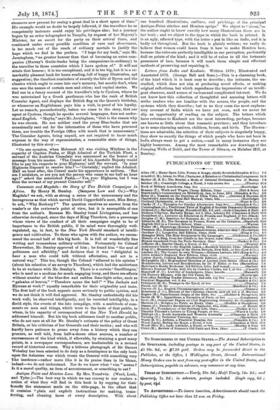To and From Constantinople. By Hubert E. H. Jerningham. (Hurst
and Blackett.)—Mr. Herbert Jerningham, having gone to Athens in a diplomatic capacity, made sundry excursions among the Isles of Greece, with two companions, and afterwards visited Constantinople under pleasant auspices. He has quick observation, high spirits, a pleasant humour, and a surprising memory, especially for poetry, for it is in- conceivable that he can have deliberately looked up the astonishing profusion of verse with which he beguiles his bright, readable, lively pages. His motive for writing the book is a praiseworthy one. "I am actuated by the desire," he Bays, "of being of WO to those who may be tempted to avail themselves of the many facilities which railways and steamers now present for seeing a great deal in a short space of time." His example would no doubt be largely followed, if the travellers he so competently instructs could enjoy his privileges also; but a journey begun by an order telegraphed to Nauplia, by request of her Majesty's Minister, for an escort for the party on their arrival there, and continued under every possible condition of care and observance, la too much out of the reach of ordinary mortals to justify the hope which we find in the preface. "I hope for my book," says Mr. Jerningham, "no greater honour than that of becoming an extra com- panion (Murray's Guide-books being the companions-in-ordinary) to the traveller in those countries which I have spoken of." It will not attain that honour; it is too exceptional, and it is too big, but it is a re- markably pleasant book for home reading, full of happy illustration, apt suggestion; the timeliest reminders of exactly the bits of Byron and the classics which ought to come into one's memory, but mostly don't, when one sees the names of certain men and cities; and capital stories. We find one in a funny account of the traveller's trip to Cyzicus, where he was entertained by a Greek gentleman who has the rank of British Consular Agent, and displays the British flag on the Queen's birthday, or whenever an Englishman pays him a visit, in proofof his loyalty. Let us remark, parenthetically, before we come to the story, that our agent at Cyzicus, though be speaks several languages, does not under- stand English. "Maybe," says Mr. Jerningham, "that is the reason why he was chosen. He can neither read the prosy Blue-books that are occasionally sent out for the information of those who have procured them, nor trouble the Foreign Office with much that is unnecessary." The Consular Agents, being unpaid, are not required to incur much expense in the way of representation, a reasonable state of things, illustrated by this story :— " On one occasion, when Mehemet All was visiting Mitylene in the capacity of Capitan Pasha, or High Admiral of the Turkish Fleet, a servant of the Austrian Consulate was announced as the bearer of a message from his master. 'The Consul of his Apostolic Majesty would like to pay his respects to your Highness,' said the servant. 'Is your Highness disposed to receive him ?'—' Certainly; replied the Admiral. Half an hour after, the Consul made his appearance in uniform. But am I mistaken, or are you not the person who came to me half an hour ego?' asked the astonished Pasha.—, Yes, your Highness, but I was then the servant of my present Consular self."



































 Previous page
Previous page